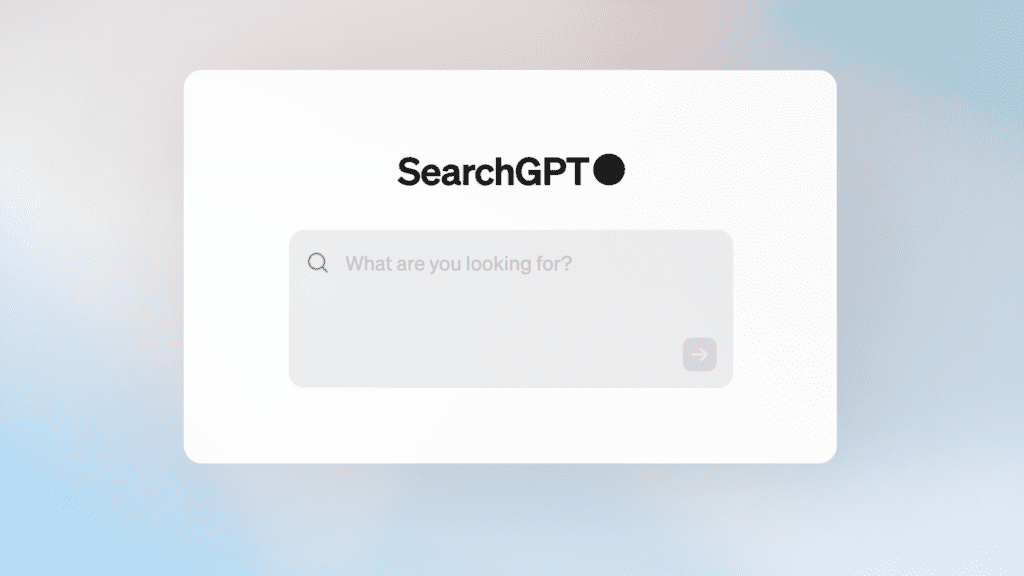
OpenAI has introduced SearchGPT, an innovative AI-powered search engine poised to disrupt the competitive search market. This move signifies OpenAI’s ambitious expansion beyond its renowned ChatGPT model, setting its sights on challenging industry giants like Google and newer AI search tools such as Perplexity.
Introducing SearchGPT
SearchGPT is a prototype search engine leveraging OpenAI’s advanced language models to create a more intuitive and efficient search experience. Unlike traditional search engines that simply return a list of links, SearchGPT aims to organize and summarize information from across the web, making it more accessible and user-friendly.
Key Features of SearchGPT:
- Intuitive Search Interface: A large text box prompts users with “What are you looking for?”, inviting a conversational search approach.
- Summarized Results: The engine provides concise summaries of search topics, followed by attribution links for further reading.
- Follow-Up Questions: Users can ask follow-up questions, making the search process more interactive and dynamic.
- Relevant Links Sidebar: A sidebar provides additional relevant links for a comprehensive information retrieval experience.
- Visual Answers: While details are limited, a “visual answers” feature is mentioned, potentially offering rich visual content to enhance understanding.
OpenAI plans to eventually integrate SearchGPT’s capabilities into ChatGPT, rather than maintaining it as a standalone product. However, a specific timeline for this integration has not been disclosed. Currently, the prototype is limited to 10,000 test users, with no announced plans for broader public availability.
The Technology Behind SearchGPT
SearchGPT is powered by the GPT-4 family of models, renowned for their advanced natural language processing capabilities. The system is designed to access and process real-time information from the internet, addressing one of the key limitations of earlier AI models.
To enhance search results, OpenAI collaborates with third-party partners and utilizes direct content feeds. Partnerships with news organizations such as The Wall Street Journal, The Associated Press, and Vox Media are crucial for:
- Enhancing Accuracy: Improving the reliability and precision of search results.
- Copyright Compliance: Addressing potential copyright concerns proactively.
- Fair Content Attribution: Providing a framework for fair attribution of content sources.
Publishers have control over how their content appears in SearchGPT’s results and can opt out of having their content used to train OpenAI’s models while still being featured in search results. This approach addresses recent criticisms and legal challenges related to the use of copyrighted material for AI training.
Benefits for Users
SearchGPT aims to transform the search experience by offering several key benefits:
- Enhanced Search Organization and Summarization: Beyond simply listing links, SearchGPT organizes and summarizes information. For instance, a search about music festivals might yield a summary of key events, followed by brief descriptions and attribution links, saving users time and effort.
- Interactive Search Experience: The ability to ask follow-up questions enables a more natural, conversational approach to information retrieval, making complex research tasks more intuitive and efficient.
- Visual Answer Capabilities: Although details are scarce, the “visual answers” feature may involve AI-generated imagery, providing users with rich visual representations of information to aid in understanding complex topics.
Challenges and Concerns
Despite its promising potential, SearchGPT faces significant challenges:
- Legal and Copyright Issues: OpenAI has faced legal action from multiple news outlets over alleged copyright violations. The proactive measures with SearchGPT, including publisher partnerships and opt-out options, aim to address these concerns, but their effectiveness remains to be seen.
- Impact on Traffic to Original Sources: Comprehensive AI-generated search results might reduce the likelihood of users clicking through to source websites, potentially affecting advertising revenue for publishers and content creators.
- Competition with Established Players: Competing with well-established players like Google, which has substantial resources and its own AI initiatives, will require SearchGPT to offer compelling advantages to attract users away from their habitual search engines.
The AI Arms Race in Generative Search
The introduction of SearchGPT is part of a broader trend of integrating AI into search products. Major tech companies, including Google and Microsoft, are rapidly incorporating AI, while startups like Perplexity are offering AI-first search experiences. This competition is driving rapid innovation in the field.
AI-powered search engines could fundamentally change how people access and consume information online, potentially shifting user behavior and affecting web traffic patterns and the broader digital economy. As AI systems become more adept at summarizing and presenting information, concerns about user critical thinking skills and the potential biases in AI-generated summaries also arise.
Conclusion
The launch of SearchGPT marks a significant milestone in the evolution of search technology. As OpenAI continues to refine and expand access to this tool, its impact on user behavior, the publishing industry, and the broader digital landscape will be closely monitored. SearchGPT represents not just an advancement in search technology but a glimpse into the future of AI-driven information retrieval.


